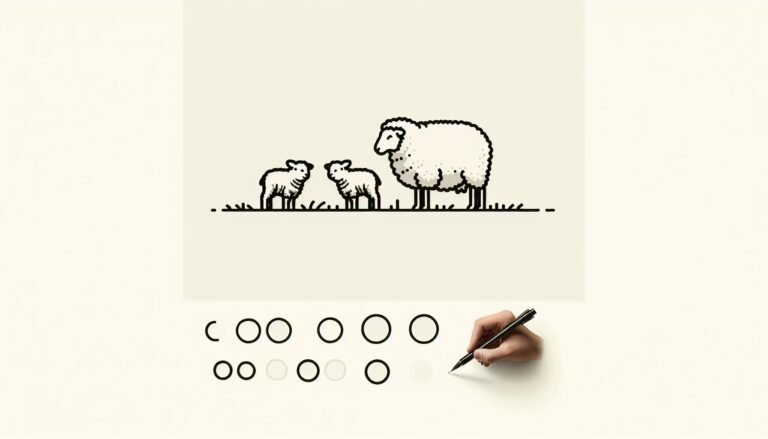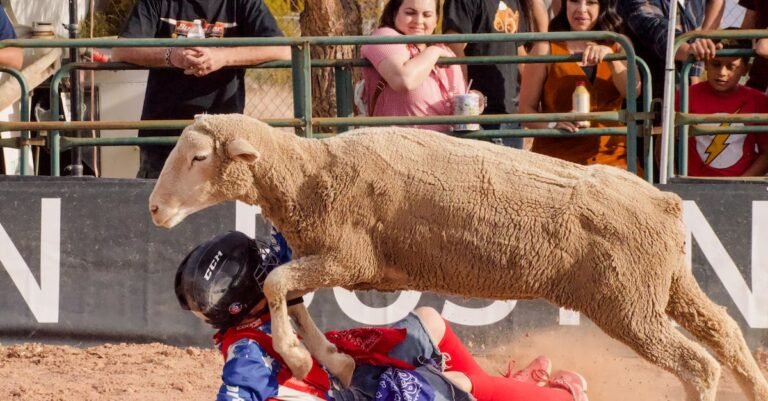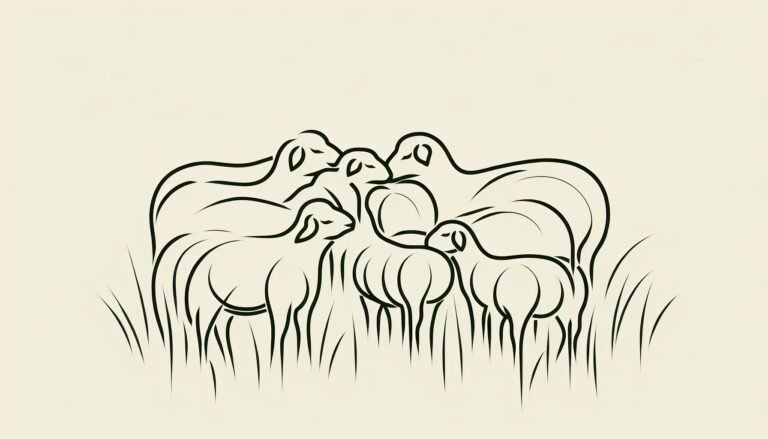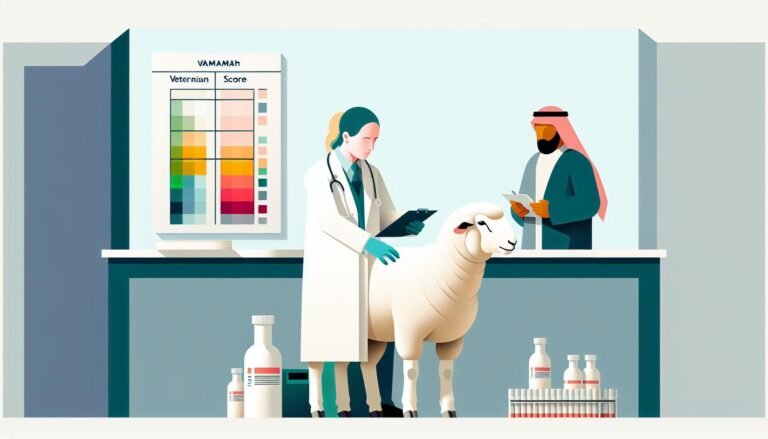Understanding the Pros and Cons of Feeding Corn to Sheep
Ever found yourself wondering, “Do sheep eat corn?” Well, you’re not alone. It’s a common question among farmers, livestock owners, and curious folks alike. In this article, we’ll delve into the diet of these woolly creatures and specifically, their relationship with corn.
Key Takeaways
- Sheep can eat corn, but it shouldn’t form the bulk of their diet. It’s best used as a supplement, especially in the colder months when fresh grass is not available.
- Corn lacks necessary proteins, vitamins, and minerals that are essential for a healthy sheep. Overreliance on it can lead to nutritional deficiencies.
- When introducing corn into a sheep’s diet, it should be done gradually to prevent digestive upset.
- Sheep, like all ruminants, have unique nutritional needs including protein, vitamins A and E, and minerals such as selenium and copper.
- The role of corn in a sheep’s diet is to provide energy through its carbohydrate content. However, it should be balanced with other feed for a well-rounded diet.
- Age, quality of corn, quantity, and the gradual introduction of corn are key factors to consider when feeding corn to sheep. A sudden shift to corn-based diets is not advisable as it can lead to metabolic disorders.
Do Sheep Eat Corn? A Common Question
It’s a common question: do sheep eat corn? Surprisingly, the answer isn’t as straightforward as one might think. We’ve seen sheep grazing in fields, contentedly munching on grass – but what about corn?
Yes, sheep do eat corn. It’s an alternative that shepherds often use, particularly when forage is limited or in the colder months when fresh grass isn’t available. But it’s not just a matter of throwing a few ears of corn into the pen and letting the sheep have at it. There’s more to the story.
Feeding sheep involves understanding their nutritional needs. Sheep have a complex digestive system that allows them to extract nutrients from a variety of plants. But their bodies are especially adept at processing plant fibers found in grasses and forage crops – not so much with the rich starches found in corn.
When corn is introduced to a sheep’s diet, it should be done incrementally. It’s because drastic dietary changes can cause digestive upset in these sensitive creatures. So if you’re looking at corn as a feed option, it’s generally best to start with small amounts and gradually increase the portions over time.
Moreover, it’s crucial to note that while corn can supplement a sheep’s diet, it should not be the primary feed source. Corn lacks the necessary proteins, vitamins, and minerals that are essential for a healthy sheep. Therefore, corn should be seen more like a treat or a supplement than the main course.
Yes, sheep eat corn. But remember, the balance is key. You wouldn’t want to make corn the only thing they’re eating. A variety of grains, forage, and supplementation should make up most of their diet if you’re looking to raise healthy, happy sheep.
Exploring the Diet of Sheep
When it comes to understanding the dietary preferences of sheep, we have to factor in their status as ruminants. Ruminants, like sheep, have a unique digestive system that enables them to derive nutrients effectively from a variety of plant materials.
Their diet typically consists of high-fiber foods like grasses and hay, supplemented with a variety of grains. Sheep are known to enjoy a variety of grains, and corn, being one such grain, can be a part of their dietary intake.
As we’ve discussed before, sheep do eat corn but it’s not as straightforward as it seems. Corn, in its raw state, is high in carbohydrates and energy but it lacks the essential proteins, vitamins, and minerals sheep require for healthy growth and production. Therefore, it should not form the mainstay of their diet. Instead, corn can be used as a nutritional supplement given in small, controlled amounts.
A question might appear in your mind – “How much corn is too much?” Well, let’s turn our focus to that.
Understanding the right amount of corn to supplement a sheep’s diet is critical. It should be noted that corn isn’t a complete feed in itself. Even though it provides a good amount of energy, it has deficiencies in essential nutrients like protein, Vitamins A and E, and certain minerals including calcium and selenium.
Allow me to illustrate this information through a simplified chart.
| Food | Energy | Protein | Vitamins | Minerals |
|---|---|---|---|---|
| Corn | High | Low | Low | Low |
| Hay | Moderate | Moderate | High | High |
| Grass | High | High | High | High |
A quick glance shows that while corn is energy-dense, it lacks in other vital nutrients compared to hay and grass.
The introduction of corn into the diet must be done gradually to prevent digestive upset in sheep. It’s recommended to start with small amounts and increase over time, monitoring your sheep’s response. Continuously balancing the diet with other essential ingredients is of utmost importance. This is a topic we’ll explore more in the next section.
Understanding the Nutritional Needs of Sheep
Sheep, like all ruminants, have unique nutritional needs. Our understanding starts with the basics. They’re designed to graze, digesting a high fiber diet of grasses and grains. As I’ve mentioned earlier, corn can be a part of their diet, but it definitely shouldn’t be the prime component. So, let’s unpack these needs a little more.
Proteins play a pivotal role in a sheep’s diet. They’re the building blocks that support their growth and production needs, whether it’s for healthy wool or meat. Vitamins and minerals too can’t be overlooked. Sheep need Vitamin A for normal growth and reproduction. Minerals like selenium and copper are essential for preventing diseases.
The diet of the sheep can also change depending on the stage of life. For instance, a lactating ewe will require a different diet than a growing lamb.
Speaking of corn, it’s high in energy but lacks necessary proteins, vitamins, and minerals. Using it as a main feed can lead to mineral deficiencies or overload, causing health problems for the sheep. That’s why it’s suggested to use corn in small, controlled amounts.
Now let’s glance over a brief breakdown of a sheep’s nutritional needs. I’ve put down the numbers for a mature sheep but these figures will vary depending upon factors like age, size, breed, and productivity.
| Nutrient | Amount per day for a Mature Sheep |
|---|---|
| Protein | 150-200g |
| Vitamin A | 1000-1500 IU |
| Copper | 10-20mg |
| Selenium | 0.1-0.3mg |
Don’t take these numbers as factual but rather as a starting point. Every herd has a different nutritional equation. Producers and shepherds need to tweak the diet depending on the specific needs of their flock. Always aim for a balanced diet, for a diet skewed in any way can lead to health problems. In our next section, we’ll delve into how to gradually introduce corn into your sheep’s diet without upsetting this balance.
The Role of Corn in Sheep’s Diet
Let’s really delve into the role of corn in a sheep’s diet. As we’ve previously discussed, corn isn’t fundamentally bad for sheep. It’s seen use over the years as a supplement, but its composition lacks key nutrients that sheep require for optimal growth and reproduction.
Sheep are ruminants, meaning they have a unique digestive system that allows them to extract nutrients from plants that non-ruminants can’t. It’s a system that thrives on a variety of different feeds, specifically those high in protein, vitamins, and minerals. Corn, unfortunately, doesn’t fit that bill.
The main components of corn are carbohydrates, particularly starch, which could provide a quick source of energy. However, corn lacks essential nutrients like protein, vitamin A, copper, and selenium which are vital to a mature sheep’s health.
| Nutrient | Present in Corn? |
|---|---|
| Protein | No |
| Vitamin A | No |
| Copper | No |
| Selenium | No |
What does this mean for the role of corn in a sheep’s diet? Essentially, corn should never be the star of the show. It can be introduced slowly into a sheep’s diet, but as a supplement rather than serving as a main component.
It’s crucial to gradually introduce corn and balance it with feeds rich in protein, vitamins, and minerals. Failing to do so could lead to a number of health issues, including poor growth and reproductive problems. In terms of fueling a sheep’s complex digestive system and meeting their dietary needs, corn alone falls short.
Instead, use corn as part of a larger, varied diet. By tailoring feed plans to meet the specific nutritional needs of your flock, you can ensure their diet is balanced and healthy. This way, your sheep can enjoy the energy benefits of corn without missing out on other essential nutrients they require for optimal health.
Factors to Consider When Feeding Corn to Sheep
When it comes to feeding corn to sheep, several factors need to be keenly considered to ensure optimal health and growth. Understanding these factors helps in making informed decisions that safeguard the health of the flock.
The First Factor is the age of the sheep. Young lambs have different nutritional needs compared to mature sheep. While they require high energy feeds such as corn, they also require substantial proteins for growth — something that corn can’t solely provide.
Another Essential Factor to consider is the quality of the corn. Ensure you’re feeding them good quality corn that’s free from toxins and mould. Badly stored corn can result in mycotoxins, hazardous to sheep health.
The Quantity of Corn fed to the sheep is a Critical Factor. Sheep, like any other animals, thrive on a balanced diet. Though corn offers energy-rich carbohydrates, it lacks essential nutrients like protein, Vitamin A, copper, and selenium. Overfeeding corn can lead to nutritional deficiencies, causing adverse health effects.
The last factor that I can’t stress enough is integrating corn gradually into the sheep’s diet. A sudden shift to corn-based diets could lead to metabolic disorders such as acidosis.
Here’s a quick peek at the key points:
| Key Factors in Corn Feeding | Description |
|---|---|
| Age of Sheep | Young lambs require more proteins while mature sheep require more energy |
| Quality of Corn | Use high-quality corn, free from toxins and mould |
| Quantity of Corn | Balance with other feeds to maintain a balanced diet |
| Integrating Corn | Introduce corn gradually to avoid metabolic disorders |
Conclusion: Balancing Corn and Other Feed for Sheep
So, can sheep eat corn? Absolutely! But it’s all about balance. Corn can be a valuable part of a sheep’s diet, providing energy-rich feed especially for young lambs. But remember, corn shouldn’t be the only thing on the menu. It’s deficient in vital nutrients like protein, vitamin A, copper, and selenium. Always make sure to store corn properly to avoid toxins and mold. Gradual introduction of corn into the diet is key to prevent metabolic disorders. It’s all about understanding your flock’s specific nutritional needs and tailoring their diet accordingly. After all, a balanced and healthy diet is what every sheep needs for optimal health and growth.







